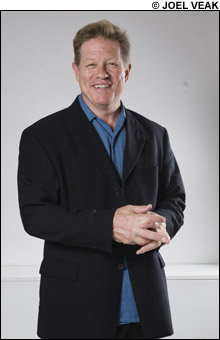
“Why can’t we build submarines for addicts, and while they get clean under water, they can patrol our coasts?” |
Comedian Jimmy Tingle is on the stump. “A lot of candidates say they want to stop crime, but none of them wants to communicate with criminals,” he says. “If elected president, I will not only have ex-convicts in the Cabinet, but I will recruit them from previous administrations.”He’s also got a handle on the energy crisis. “What about tapping the human energy in America — the bicycles in health clubs? Why can’t we hook those up to generators?”
Tingle brings his newly revamped one-man show Jimmy Tingle for President to the Arsenal Center for the Arts in Watertown for a run beginning next Thursday, July 24. He’s the latest to hit the road to the Oval Office in a line of humorists that starts with Will Rogers and continues on through Pat Paulsen and Stephen Colbert. And why not? Tingle has been a man of ideas since the late 1980s, when he broadened his approach to comedy, abandoning traditional stand-up for political and social satire. That move made him the toast of England and a commentator on 60 Minutes II and MSNBC here in the States. It even netted him an HBO special.

Until last October, the Cambridge born-and-raised comic was also the proprietor of Jimmy Tingle’s Off Broadway theater in Somerville. “We did a lot of great shows and had a lot of fun,” he explains in a vowel-tugging Boston twang when we speak by phone, “but I was becoming more of a businessman and less of a performer and writer. To go to another level, I had to let it go. Jimmy Tingle for President is a way for me to be engaged in all the day’s issues. It compels me to think about solutions and to be funny and insightful.”
So I question the faux campaigner.
Are you a Paulsen or a Rogers candidate?
I’m more of a Rogers candidate, because he was a better comedian and writer.
What experience do you have?
In 2000, I did Jimmy Tingle for President for a week at the Comedy Connection and a week in Wellfleet.
Why run again?
This is an interesting time for a humorist like me. Politics is so mainstream now. When I started doing political humor in the ’80s, very few people were. There was no cable, no Daily Show. Now we’re inundated with the topics of the campaign, and people are overwhelmed by the seriousness of it.
I’m having the most fun I’ve had on stage with these shows. One of my favorite parts is a press conference with the audience. They ask questions, which means I get to improvise, so that portion of the show is never the same. They start taking it really seriously, yelling questions like, “What are you gonna do about the falling dollar?”
In the ’80s, you made a pivotal change in your comedy. What happened?
Well, I got sober in ’87, ’88, and I took a more serious approach. I started paying attention more to what was going on and relying more on my education and the topics that interested me in school: sociology, history, political science. My family was politically involved. My uncle [Joseph DeGuglielmo] was a city councilman, city manger, and mayor of Cambridge.
And the ’80s was also an interesting, very conservative time — coming out of the Reagan years and going into the first Bush presidency. And being a Democrat living in Massachusetts, comedy was a great outlet for a political point of view.
So I moved to New York and started pursuing the goal of a one-man show of social and political humor in a theater atmosphere. Eric Bogosian, Spalding Gray, John Leguizamo, and Reno were all doing one-person shows there, and Jackie Mason started his show on Broadway. I found them all inspiring. And working in places where they weren’t serving alcohol, I found an audience that paid more attention, were politically aware, and were happy to allow me to develop themes instead of shooting for a laugh every 15 seconds.
What’s your take on the other candidates?
I’m going to be diplomatic. I might need some of these people in my Cabinet if I’m elected. Plus, if I lose, maybe there are some platforms in my campaign they’d like to borrow.
For example, I’d broaden the definition of national defense to include health care, education, and alcohol and drug treatment. There are plenty of people who can’t get into rehab programs because they don’t have money or assistance, but at the same time we can put a new round of nuclear warheads in submarines and send them around the world’s ocean. So why can’t we build submarines for addicts, and while they get clean under water, they can patrol our coasts? If they stop a suspicious boat, who’s gonna be better at finding drugs aboard than these people?